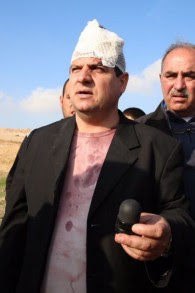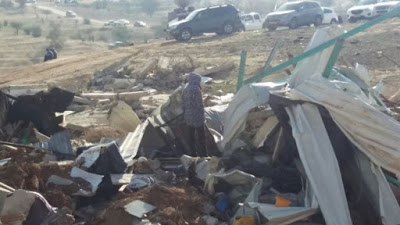Israeli Arabs are 20% of the population yet they occupy 2½% of the land
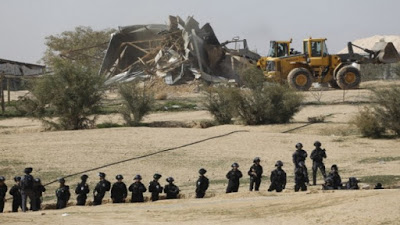 |
| Israeli policemen stand guard as bulldozers demolish homes in the unrecognized Bedouin village of Umm al-Hiran in the Negev desert, on January 18, 2017. (AFP Photo/Menahem Kahana) |
You might think that a new Bill to prevent building
contrary to the planning laws of Israel might be uncontroversial. After all you can’t have everyone building
where they want to. It is a principle
that should be uncontroversial. However
in Israel it represents another attack on Israel’s Palestinians.
of Arab houses. In the occupied
territories settlers can build where they want and when they want, whereas unauthorised
Palestinian buildings are regularly demolished.
population, its Arab citizens live in just 2.5% of the land. It is the same percentage as pertained in
1948 after the expulsion of ¾ million Palestinians. At that time the Arab population was 150,000. Now it is 1.5 million Not one new Arab town has been
established. Israeli planners regularly,
almost as a matter of course, deny Arabs the right to construct new buildings
or even build extensions to their houses.
sector which the State is helping to intensify.
This Bill heralds another racist attack on Israel’s 20% Arab minority
under the guise of enforcing the law.
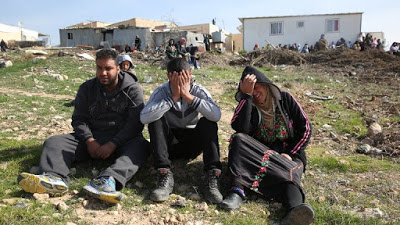 |
| Bedouins cry following the destruction of houses on January 18, 2017 in the Bedouin village of Umm al-Hiran. (AFP/ MENAHEM KAHANA) |
Communities Act which allows hundreds of existing Jewish villages and
settlements to deny access to Arabs on ‘social’ grounds and then you see how Israel
reinforces discrimination against its Arab citizens.
demolished, they live under the threat that police bulldozers will come in and
demolish peoples’ homes and all their possessions. There isn’t one Jewish village or town in Israel
which is ‘unrecognised’. Being ‘unrecognised’
means having no running water, sewerage facilities or electricity. Literally may Israel’s Palestinian citizens
live in the dark age compared to Israel’s Jews.
practice.
Editorial: Construction, Not Destruction
Israeli Arabs constitute 20 percent of the population, Arab communities’
jurisdictions occupy just 2.5 percent of the state’s land area, and the process
of approving new construction in Arab towns takes decades.
Editorial Apr 04, 2017 3:26 AM
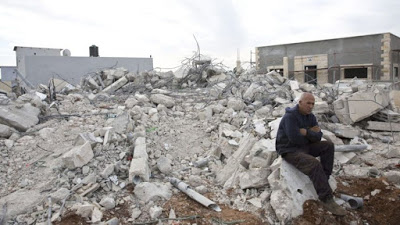 |
| A demolished building in Kalansua, January 10, 2017. Moti Milrod |
Knesset will be convening tomorrow for a special recess session to hold the
final votes on a bill that would boost enforcement and penalties for building
without a permit. The bill increases the maximum sentence for building
violations to three years, does not distinguish between building violations
committed for profit and those committed for lack of an alternative, and limits
the role that judgment and court intervention can play while enhancing the
authority of the Finance Ministry unit that enforces construction laws. This
favors the administrative track over a system of checks and balances.
initiated by the Justice Ministry, doesn’t explicitly say that it’s aimed at
the Arab public in Israel, but it’s clear to all that its consequences will
primarily affect Arab communities. Between 2012 and 2014, 97 percent of the
administrative demolition orders were issued against structures in these communities.
Moreover, the bill is being promoted by a government that is pleased to pass
discriminatory legislation like the muezzin law, the expropriation law, the
impeachment law and the cultural loyalty law.
disputes that illegal construction must be dealt with, that all Israeli
citizens are meant to obey the law and that the bill is worded in a totally
professional manner. However, the bill should not be passed at this stage
because it deals solely with enforcement, without providing a solution for the
essential problem – a housing crisis in Arab communities – and without
recognizing plans being put into place.
in the past the government has established that the funding for implementation
of this law will be taken from the budget designated for the development of
Arab communities. This looks suspiciously as if the bill is aimed at
intensifying the abuse of the Arab population and continuing the government’s
incitement policy against it.
 |
| Yaqoub Mousa Abu al-Qia’an – Arab schoolteacher murdered by Israeli police at Umm al Hiran(Courtesy) |
Justice Ministry was really interested in solving the problem of illegal
construction, it would implement those master plans for Arab communities that
have already been approved, expedite the approval of those that have yet to be
approved, increase the number of planning committees dealing with these
communities, and only afterward declare an enforcement crackdown.
Israeli Arabs constitute 20 percent of the population, Arab communities’
jurisdictions occupy just 2.5 percent of the state’s land area, and the process
of approving new construction in Arab towns takes decades. The combination of
these things and the lack of any workable alternatives cause a housing crunch
and expand the scope of illegal construction. This bill does not seek to solve
the problem, but merely to make life more difficult for an already distressed
population.
article is Haaretz’s lead editorial, as published in the Hebrew and English
newspapers in Israel.
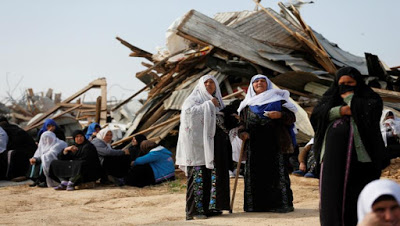 |
|
Israel wants to build a Jewish only town in place of a Bedouin village [Anadolu]
|
Raid Arab-Israeli Neighborhood, Injure Residents
(Jerusalem) – Israel
should immediately cease the discriminatory demolition of homes belonging to
Palestinian citizens of Israel, Human Rights Watch said today. Israel should
ensure equal treatment in planning and zoning procedures for its non-Jewish
citizens, and carry out demolitions only as a last resort along with compensation
or alternative housing arrangements.
“Israeli authorities allow buildings that will benefit
Jewish citizens while demolishing Arab houses next door,” said Sarah Leah
Whitson, Middle East director at Human Rights Watch. “That obviously
discriminates against non-Jewish Israelis, but officials haven’t given any
justification for this clear difference in treatment between citizens.”
On December 13, 2010, Israel Land Administration inspectors
and Israeli police demolished six homes belonging to Palestinian citizens of
Israel in the Abu Tuk neighborhood of Lod, a city near Tel Aviv, displacing 67
members of the extended Abu Eid family, 27 of them children. On March 2, 2011,
Israeli police entered the same neighborhood and destroyed the bases for two prefabricated
homes the family had planned to erect there; displaced family members are
currently staying with neighbors or living in tents. Israeli authorities say
the homes lack building permits, but repeatedly refused to grant such permits;
they argue that the land is zoned as “agricultural” rather than
“residential” but have refused to re-classify the land as
residential.
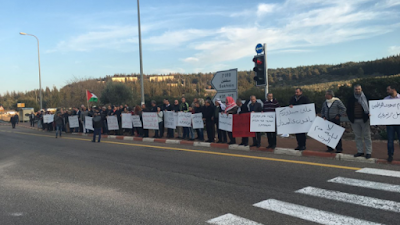 |
| Arab Israelis hold protest banners against the demolition of homes in the unrecognized Bedouin village of Umm al-Hiran, January 19, 2016. (Courtesy) |
However, Israeli authorities recently rezoned land adjacent
to the demolished site from agricultural to residential land, and are planning
a housing development there for Israeli security service personnel. Plans for a
Jewish religious college have been approved on another nearby site.
Thirty percent of the 70,000 residents of Lod are
Palestinian Arabs, according to Israeli government statistics. While official
figures are not readily available, more than 70 percent of Palestinian Arab
homes in Lod and the nearby city of Ramle have no legal status, according to a
project on Israeli cities with mixed populations run by Shatil, an Israeli nongovernmental
group.
Hundreds of homes in Lod are under immediate demolition
orders, virtually all of them in Palestinian Arab neighborhoods, according to
the Shatil project. In addition, approximately 1,600 housing units in Lod are
currently designated as “illegal,” and thus subject to demolition
orders, because they lack proper building permits, according to a government
statement.
According to residents who are Palestinian Arab citizens of
Israel, however, planning authorities repeatedly rejected their applications
for permits. Israeli planning authorities by contrast recently approved plans
for a seven-hectare campus for a Jewish religious college immediately beside
the demolished area.
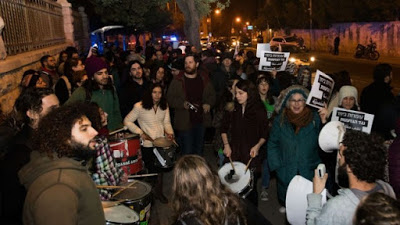 |
| Israelis attend a protest against the recent demolition of Bedouin homes in the village of Umm al-Hiran outside the Prime Minister’s office in Jerusalem on January 18, 2017. (Yonatan Sindel/FLASH90) |
Israeli officials have explained that Arab-Israeli homes
have been destroyed on the basis that they lacked permits, but that raises the
issue of who is being granted permits. Human Rights Watch is not aware that
Israeli officials have justified why Arab-Israelis have a harder time obtaining
building permits or access to residential planning solutions in general.
Approximately 500 police officers arrived in the Abu Tuk
neighborhood at 8 a.m. on a rainy December 13 and evicted the residents of six
buildings before demolishing them. The independent Palestinian Ma’an news agency
described one case in which armed police broke down a door and “pointed
their rifles” at a brother and sister aged 11 and 12 and told them,
“Don’t move,” before forcing them outside. Other residents told Human
Rights Watch that the police did not allow them to save their possessions
before demolishing their homes.
The families, after salvaging some belongings from the
rubble, pitched five tents that they bought with donations, and placed a sign
over their plot that read, “Abu Eid Refugee Camp.” For three months,
male members of the family, about 30 people, have been living in five tents on
the ruins of their former houses, while the women have been staying with
neighbors.
The families had been planning to erect two small,
prefabricated homes, but on March 2, around 200 police destroyed the homes’
bases and clashed with residents, injuring several. Kawser Abu Eid, a
39-year-old mother of five whose home was one of the six demolished in
December, told Human Rights Watch that three of her children were home during
the March demolitions, and that her 12-year-old son was hospitalized with a leg
injury. A female neighbor’s arm was broken when she tried to protect the boy,
witnesses told Human Rights Watch. A police spokesperson told Human Rights
Watch that no police forces were injured.
Police arrested four members of the Abu Eid family and one
neighbor for resisting the evictions. They were released the next day under
conditions of house arrest. Israeli civil society workers who were following
the case told Human Rights Watch that they were not sure how the authorities
would enforce the house arrest order, since the residents’ homes had already
been destroyed.
According to residents, the family complained about the
December demolitions to Brigadier General (res.) Ilan Harari, who until
February 2011 served as the head of Lod’s municipality, and who agreed to write
to the Welfare Ministry, the Housing Ministry, and the Israel Land
Administration requesting assistance for the families. Human Rights Watch does
not know whether the letters were sent. To date, the residents say, they have
received no assistance.
“My kids have no home; they can’t study under these
conditions,” Kawser Abu Eid said. “The head of the municipality
promised to care for us months ago, but nothing has happened.”
Israeli planning authorities have approved residential and
educational building projects intended to benefit primarily Jewish Israelis on
sites next to the demolished homes. In 2008 Israeli authorities began rezoning
agricultural land for residential construction in the next-door Jewish
neighborhood of Ganei Aviv, according to the Israel Land Administration. An
October 2010 government decision urges other government agencies to complete
plans for the neighborhood within six months, and directs that the land be
allocated for housing for Israeli military and other security service
personnel.
Directly beside the demolished homes, Israeli authorities
have approved plans for a 7-hectare yeshiva (religious college) that will,
according to the Lod Municipality website,
“bring thousands of religious students and families to Lod.” Harari
said that this college will bring in “high-quality residents.” On
October 7, Minister of Interior Eli Yishai told Israeli media that “the
thing that will help the city of Lod will be bringing another 50,000 Jews
there. That’s what will save and keep the city, I don’t have another
solution.” The 50-million shekel project will be located on land
previously designated as a “public open space.” The Lod city council
unanimously approved the allocation of the land to the yeshiva, the Lod
Municipality stated.
“When it comes to housing rights in Lod, Israeli
officials seem to have one rule for Palestinian citizens, another for Jewish
citizens,” said Whitson. “That kind of discrimination has been
rejected the world over.”
Members of the Abu Eid family told Human Rights Watch that
they had been living in the houses in Lod since the 1950s, after Israeli
authorities evicted them from their original homes in the Hula Valley region in
northern Israel.
The Abu Eid family had been leasing land in Lod from the
state of Israel, which controls 93 percent of the country’s land and in most
cases does not sell land but leases lots for 49 or 98 years. The land in
question was zoned as an agricultural rather than residential area, a
designation that restricted the permissible size and density of homes. Human
Rights Watch has documented
that Jewish towns and neighborhoods in the Lod area were also originally zoned
for agricultural use, but authorities rezoned that land to allow residential
construction.
Israeli planning authorities denied the Palestinian
residents’ repeated requests to re-zone the area to permit residential
building. As a result, the structures that residents built lacked permits and
were deemed “illegal.” The Israel Land Administration first issued an
eviction order against the homes in 2002. In 2010 the family lost a prolonged
legal struggle when the Ramle Magistrate’s Court rejected their appeal against
the demolition orders, finding that the homes were built illegally on
agricultural land.
In addition to the Abu Eid family, another 45 Arab-Israelis
with homes in the same area received notices that authorities would bulldoze
their houses by the end of 2010. Authorities demolished two Arab homes in the
same neighborhood in October.
Israeli law requires the owners of demolished homes to pay
the municipality for the cost of the demolition or face a criminal sentence,
including imprisonment. Faced with this threat, some Palestinian Arab residents
in Lod have demolished their own homes.
In October 2010 the government passed a large
“emergency assistance” plan meant to “strengthen and develop the
city of Lod,” according to the prime minister’s office. A quarter of the
funds for that plan, 40 million shekels (US$11 million), will be used to create
an “eviction authority” for “enforcement regarding illegal
construction” for the next two years, with the possibility of an
additional 10 million shekels in case of need. By contrast, the decision
allocated only 3 million shekels (US $830,000) for projects that
“advance” the Palestinian Arab community in the city, and even this
part of the plan does not mention new building projects. The plan does indicate
that authorities will re-zone an Arab neighborhood of Lod, Pardes Snir, from
agricultural to residential, and construct housing units there, but notes that
many existing Arab-owned buildings will first have to be demolished.
Throughout Israel, tens of thousands of Palestinian Arab
homes lack required permits and are at risk of demolition. Israeli authorities
demolished 165 houses belonging to Palestinian citizens of Israel across the
country in 2009, according to the Arab Center for Alternative Planning, an
Israeli nongovernmental organization. Human Rights Watch has reported
on discriminatory planning procedures in the unrecognized Arab-Israeli
community of Dahmash, near Lod.
